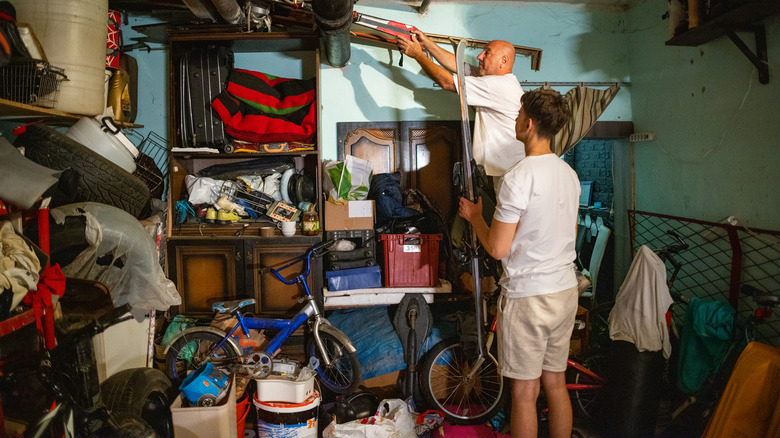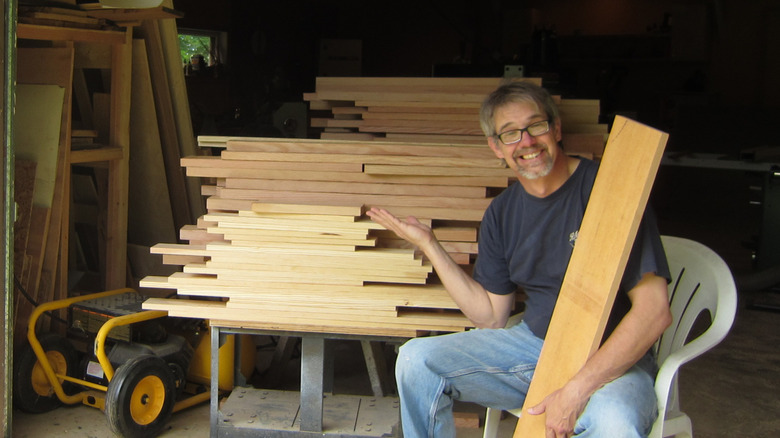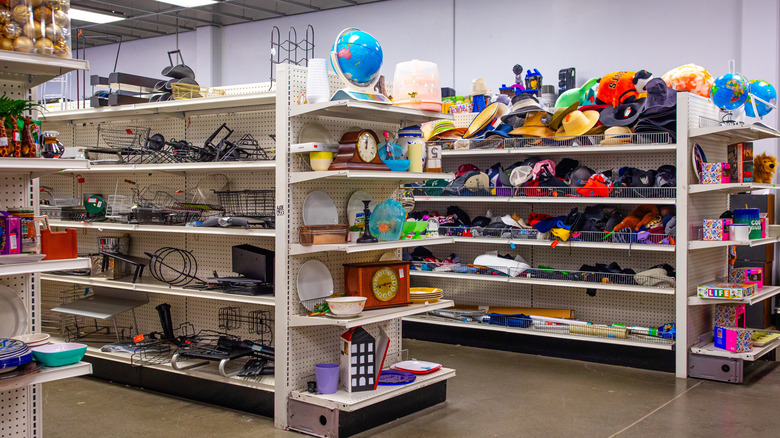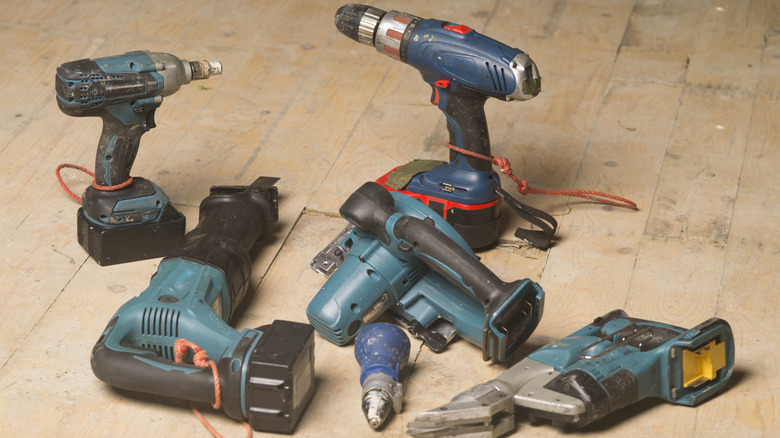Things To Throw Out From Your Garage And Workshop For A Tidier Space
Wise people say the first step in addressing a problem is admitting that there is one. Personally, admitting I was powerless over the mess in my garage was hard, but not nearly as hard as throwing out the offending objects. Because, in my defense, the objects didn't offend me, I had an emotional attachment to them. Those Marie Kondo decluttering techniques — only keeping objects that bring you joy -– yeah, not working. Complicating this effort is that I am an expert woodworker and I use my garage as my workshop. So, in addition to the normal flotsam and jetsam of life, I've got tools and machines and lumber ... lots of lumber. So, how should we approach throwing things out from the garage or workshop to get a tidier place? The basic steps are sort, identify, and decide. It may spark an emotional crisis, but it can be done.
Some good advice for starting this task is to take everything out of the garage until you have bare walls. This is when the sorting can start. Do I need all 15 extension cords? (Perhaps! But what if there is a power outage and I need to power my house from the generator that I do not own? ... Perhaps not.) Two coffee cans full to the top with nails, 7 quarts of chainsaw bar oil, six half empty quarts of latex paint, two packages of LVP flooring left over from the basement (what if I scratch my floor?!), nine paint roller frames, three crow bars, even I can see this might be excessive. Sorting is the first step. Then decide: four extension cords, no cans full of nails, 1 quart of chainsaw oil, zero paint, two roller frames and one crowbar.
Godot is not coming get rid of it
It is not terribly hard to rid yourself of multiples as discussed above, but what about singular things that are deemed "too good to throw away"? I confess that my wife, Mary, is very good at decluttering and getting rid of unneeded items. (She is exceptionally good at getting rid of my items, but that is another article.) One of my biggest challenges in throwing out specific things is admitting that I will never have a use for them. My powerful imagination can see unlimited opportunities for a widget. But, sadly, experience tells us that they will never come to pass. Items like an antique light socket; a singular, cool-looking piece of hardware (I have lots of non-matching hardware that is too good to throw away), odd chunks of aluminum bar stock, and steel that "could do something." So, how do you decide on this stuff?
One way is to ask advice from your partner or someone you cohabitate with. My wife has a great critical eye and a ruthlessly practical nature. Advice from others, a neighbor, friend, or child, may also provide clarity. Be willing to accept their judgment. As a professional woodworker, I have a terrible time getting rid of scrap wood. I can, in my mind, always find a way to use it, even if it is tiny. But in truth, I almost never find a use for a specific piece. Getting rid of it in a fireplace or campfire is an enjoyable and practical way to declutter here. You can compost wood too, since it's a natural substance. After all, wood does grow on trees (well, trees are wood), no need to stockpile, nature will make more.
How to purge, disposing of your stuff
Here is a harsh statement that I want you to say out loud: Your children, brother-in-law, neighbor, and co-worker do not want an air compressor with a broken pressure gauge (or whatever it is you are trying to give them). Getting rid of your stuff does not mean sending it all to a landfill. There are many ways to get the flotsam out of your garage responsibly. I have had success putting an object on the corner of my lot with a sign that says free. A can full of nails or screws can completely be recycled (just make sure you check with your local municipality on the best way to do so). So can light sockets and the odd chunk of aluminum or steel. My leftover LVP flooring would be accepted at a place that recycles building materials like Habitat for Humanity. They would likely take nails and screws as well. Recyclers even take donations of kitchen cabinets.
The point here is to be responsible as you throw out items from your garage. Some of it may indeed need to go to a landfill, but you may surprise yourself with how effectively you can avoid that with some creativity, effort, and energy. With enough dedication, you can probably recycle everything in your house! Places that sell used items like Goodwill and secondhand stores are worth looking into. In my county, we have a hazardous waste drop off center where used oil, half full paint cans, and other hazardous chemicals are disposed of in an environmentally sound process.
Goodbye old friend, happy trails
I mentioned earlier that I am a professional woodworker and my garage often doubles as my shop. As such I have a host of power tools, handheld, corded and cordless, benchtop, and stationary machines. These are in addition to my collection of yard and home improvement tools. Like all things manmade, these have a limited life cycle. At some point in time, they will become obsolete, broken, or impractical, regardless of how attached you may have become to them. (I kept my dad's handheld circular saw for years, even though it would smoke when in use and occasionally give me electrical shocks when I used it. It had sentimental value.) The challenge here is to do it responsibly while avoiding the landfill.
Some tool brands will allow you to drop off one of their old tools and recycle it. Bosch is especially active in promoting the "circular economy," which includes recycling. Dispose of your tool's batteries (batteries can be damaging to the environment if not disposed of properly) in accordance with your local environmental regulations. You may be able to find local companies or organizations that will help you dispose of the batteries properly.
Achieving a tidier garage may seem a Herculean task at the outset, but even pack rats like me can do it and the results are satisfying and practical. By throwing away your unneeded things and organizing your garage storage, you will create a cleaner and safer environment to work in and store the things you really do need.



